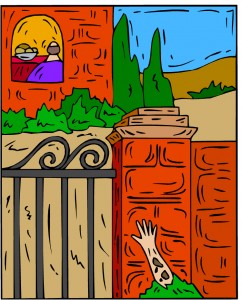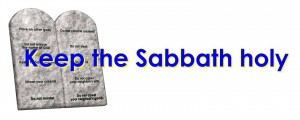Hello Everyone. Here is a new study I have just authored that I’m releasing for the first time. If you find any typos, please let me know. No matter how many times I edit my stuff, I always miss some things. Thanks in advance. Enjoy! Natan
How the Early Church Forsook the Sabbath for Sunday Worship
by Natan Lawrence
Hoshana Rabbah Biblical Discipleship Resources
Purpose of This Study
The study of how the early (post-apostolic) church turned away from a Torah-centric orientation and embraced the theology that is now the skeletal framework of modern mainstream Christianity is a complex and difficult one, since we have to look back 2000 years to review scanty historical data. Different researchers will view the same tiny amount of documentation that remains from that era and arrive at different conclusions. The final analysis is often determined by the theological glasses the scholar is wearing and thus viewing the data from. Those who start with a pro-Torah penchant or even bias versus an anti-Torah bias will likely come to different conclusions.
Suffice it to say, the brief study that follows will in no way do justice to the subject of how the early church turned Sabbath to Sunday. Our goal is merely to introduce the reader to a different point of view than they have commonly heard in the mainstream church. In this study, we will have achieved our goal if we can gently persuade the reader at least to have an open mind, and to prove all things to see if they are true, and, perhaps, they will, at least, consider the idea that some long-held and institutionalized mainstream Christian beliefs may be more fiction than fact.
Christian Tradition With Regard to Sunday
Why the mainstream church embraces Sunday over Sabbath observance can be summarized succinctly as follows:
The celebration of the Lord’s Day [Sunday] in memory of the resurrection of Christ dates undoubtedly from the apostolic age. Nothing short of apostolic precedent can account for [its] universal religious observance in the churches of the second century. There is no dissenting voice. This custom is confirmed by testimonies of the earliest post-apostolic writers, as Barnabas, Ingnatius and Justin Martyr… (History of the Christian Church, vol 2, pp. 201–202, by Philip Schaff).
In his book, Our Father Abraham, Christian scholar Marvin Wilson takes a more moderated approach when discussing the issue of the early church’s switch from Sabbath to Sunday. He admits the existence of tension between the Jews and Gentile believers over adherence to the Torah making a move from Sabbath to Sunday “exceedingly difficult, if not virtually impossible.” Potential Jewish converts to Christianity, he notes, would have been suspect of any faith that would abandon the Torah (law of Moses) or the Jewishness of one’s past (Ibid., pp. 79–80). Unlike some of his more dogmatic scholarly colleagues, Wilson admits that it is not known when the early church began Sunday worship. He seems to concede to some possible allusions to Sunday worship in the New Testament (NT) by citing several of the scriptures that Christians perennially use to “prove” Sunday observance in the primitive (apostolic) church (e.g., Acts 20:7; 1 Cor 16:2), but he’s reluctant to see these as a clear apostolic mandate for a switch from Sabbath to Sunday. He admits that the Acts 20 passage may be a reference to the Saturday evening (Heb. havdallah or Motza’ei-Shabbat) service, which was, in reality, simply an extension of the regular daily Sabbath service into the evening (Ibid., p. 80).
Our approach to analyzing the subject of when Sunday worship began in the Christian church will be somewhat different than the conventional method of sabbatarians to simply refute the arguments Sunday-keepers make in favor of Sunday worship by quoting NT verses that may suggest a Sunday replacement of the Sabbath. This approach, though seemingly a valid one, ignores the proverbial elephant in the room. That “elephant” is the undeniable pro-Torah views and practices of Yeshua and his apostles, which, when considered, makes their changing Sabbath to Sunday observance a highly incongruent if not an impossible proposition without making the Word of Elohim to lie and the apostles to be lying hypocrites.
The Elephant in the Room: The Apostles Were Pro-Torah
Before commencing our trip back in history to discover the origins of Sunday worship, it’s proper for me to disclose my bias. I start from the premise that all the apostles were not only pro-Torah, but were Torah obedient. This is based on many scripture references, a few of which are referenced below (hundreds more could be given!).
- Speaking of Paul, “You yourself also walk orderly and keep the law….” (Acts 21:24)
- Paul states, “I am indeed a Jew, born in Tarsus of Cilicia, but brought up in this city at the feet of Gamaliel, taught according to the strictness of our fathers’ law, and was zealous toward God as you all are today.” (Acts 22:3)
- Paul testifies, “But this I confess to you, that according to the Way which they call a sect, so I worship the God of my fathers, believing all things which are written in the Law and in the Prophets.” (Acts 24:14)
- Paul says, “Neither against the law of the Jews, nor against the temple, nor against Caesar have I offended in anything at all.” (Acts 25:8)
- Paul writes, “Do we then make void the law through faith? Certainly not! On the contrary, we establish the law.” (Rom 3:31)
- Paul writes, “Therefore the law is holy, and the commandment holy and just and good.” (Rom 7:12)
- Paul writes, “I thank God—through Jesus Christ our Lord! So then, with the mind I myself serve the law of God.” (Rom 7:25)
- Paul writes, “Owe no one anything except to love one another, for he who loves another has fulfilled the law. For the commandments, you shall not commit adultery, you shall not murder, you shall not steal, you shall not bear false witness, you shall not covet, and if there is any other commandment, are all summed up in this saying, namely, you shall love your neighbor as yourself. Love does no harm to a neighbor; therefore love is the fulfillment of the law.” (Rom 13:8–10)
- Paul writes, “Circumcision is nothing and uncircumcision is nothing, but keeping the commandments of God is what matters.” (1 Cor 7:19)
- James writes, “If you really fulfill the royal law according to the Scripture, ‘You shall love your neighbor as yourself, you do well’; but if you show partiality, you commit sin, and are convicted by the law as transgressors. For whoever shall keep the whole law, and yet stumble in one point, he is guilty of all. For He who said, ‘Do not commit adultery,’ also said, ‘Do not murder.’ Now if you do not commit adultery, but you do murder, you have become a transgressor of the law. So speak and so do as those who will be judged by the law of liberty.” (Jas 2:8–12)
- John writes, “Now by this we know that we know Him, if we keep His commandments. He who says, “I know Him,” and does not keep His commandments, is a liar, and the truth is not in him. But whoever keeps His word, truly the love of God is perfected in him. By this we know that we are in Him. He who says he abides in Him ought himself also to walk just as He walked. Brethren, I write no new commandment to you, but an old commandment which you have had from the beginning. The old commandment is the word which you heard from the beginning.” (1 John 2:3–7)
- John writes, “Whoever commits sin also commits lawlessness, and sin is lawlessness.” (1 John 3:4)
- John writes, “And the dragon was enraged with the woman, and he went to make war with the rest of her offspring, who keep the commandments of God and have the testimony of Jesus Christ.” (Rev 12:17)
- John writes, “Here is the patience of the saints; here are those who keep the commandments of God and the faith of Jesus.” (Rev 14:12)
- John writes, “Blessed are those who do His commandments, that they may have the right to the tree of life, and may enter through the gates into the city.” (Rev 22:14)
With these verses as a foundation for understanding the pro-Torah position of the apostolic writers, we now want to consider a couple of other facts. Continue reading →





